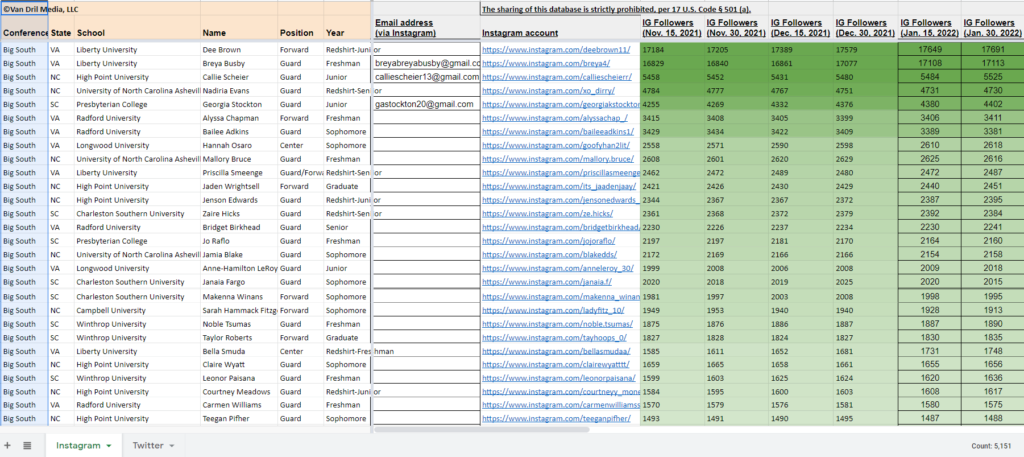The databases we at Contact College Athletes have built are truly unique.
They include athletes’ social-media accounts on multiple platforms, follower counts and growth rates on each platform — and even email addresses. None of this data that we’ve compiled exists anywhere online.
Never before has there been a directory of college athletes’ Twitter and Instagram accounts, but we’ve built them for several different sports. The platforms are separated into different tabs on our spreadsheets.

A look at the Big South women’s basketball players with the most followers on Instagram. Screenshot taken on Feb. 1, 2022.
Notice the Twitter tab on the bottom left corner of the screen in the sample above. By the end of February, TikTok accounts will also be added to our databases.
Beyond compiling each athlete’s social-media accounts, we’ve built a system that tracks each athlete’s number of followers on all the different platforms. We run it every two weeks, and provide bi-weekly updates to our customers. The Excel spreadsheets arrive via email.
We’ve been amassing that follower-count data for our four original databases (FBS, DI MBB, DI WBB, DI WVB) since October 30th on Twitter, and November 15th on Instagram.
The collection of follower-count data allows our subscribers to make more-informed decisions by using another feature of our databases — follower-count growth rates.
Let’s say you’re a business looking to partner with the college football player who has had the largest growth of Instagram followers over the last two-and-a-half months — from Nov. 15, 2021 to Jan. 30, 2022. Would you know who that is?
With our database, you’d have access to that information. You would know these are the five players who added the most followers.
- QB Bryce Young (Alabama sophomore)
- CB Sauce Gardner (Cincinnati junior)
- DE Aidan Hutchinson (Michigan senior)
- QB Stetson Bennett IV (Georgia senior)
- DB Jordan Battle (Alabama junior)
None of those five are terribly shocking. Each is a high-profile player on a team that made it to the CFB playoff.
But let’s say you’re a smaller business, and you don’t have the budget to partner with Heisman winners and potential first-round draft picks. You can not only sort the spreadsheet by total followers and scroll down until you find somebody whom you think would lead to a better ROI, you would also know which college football players saw their Instagram followings grow by the highest percentages from Nov. 15, 2021 to Jan. 30, 2022.

A sample of the top rates of growth (by percentage) amongst FBS players from Nov. 15, 2021 to Jan. 30, 2022. Sorted by column R.
That’s rather surprising, right?
You can also use varying time horizons — two weeks, one month, six weeks — to identify which athletes have had a great deal of short-term growth. Eventually, we will have follower-count information stretched over multiple years.
That’s not all.
We have gone through each athlete’s Instagram account and compiled every email that is listed on their Instagram accounts. There are still a minority with them listed in each sport, but that number is likely to grow — and we will check it once-per-quarter, then add those that are new. We will also update all of roster data, for every sport, twice-per-year.
Moreover, our lists include a bevy of athlete-specific information that can make all the difference for companies, marketing agencies and NIL marketplaces/platforms looking to partner with athletes based on factors like their year in school, position, the conference they play in, their hometown and/or the state they play in.
All of that information is in our databases.
Let’s say, for example, you’re running marketing for a start-up in the Midwest and your goal is to strike an NIL deal with an up-and-coming men’s basketball player in order to maximize your ROI, but you don’t know who to target. With our lists, you can ask a question as specific as, “Which freshman basketball player in the Big Ten has seen their Twitter following grow at the highest percentage over the last two weeks (Jan. 15, 2021-Jan. 30, 2021)?”
Here’s your answer.

A look at who is the freshman with the most growth on Twitter from Jan. 15, 2022 to Jan. 30, 2022. Sorted by column O.
It’s with this type of very-specific information that companies, especially those without a limitless marketing budget, can use our databases to make a more-informed decision that’s better for their business.
**************************
Lastly, the number of databases we offer will grow in the coming months. We are planning to add similar lists for baseball, beach volleyball, women’s gymnastics, women’s swimming, softball, high-school basketball (girls and boys) and high-school football. It’s also our goal to expand beyond Division I — to Division II, Division III and NAIA.
The end goal is to have every sport, at every level, but the order in which we do so isn’t set beyond what we’re working on currently. Please don’t hesitate to reach out if you’re interested in a particular database, or databases, that we don’t currently provide — or if you have any questions, or would like to see an additional sample.